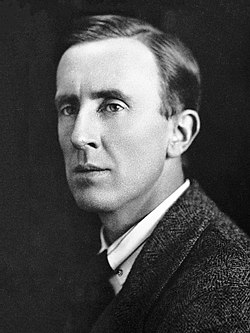J.R.R. Tolkien Quote
For Isildur would not surrender it to Elrond and Círdan who stood by. They counselled him to cast it into the fire of Orodruin night at hand... But Isildur refused this counsel, saying: 'This I will have as weregild for my father's death, and my brother's. Was it not I that dealt the Enemy his death-blow?' And the Ring that he held seemed to him exceedingly fair to look on; and he would not suffer it to be destroyed.
J.R.R. Tolkien
For Isildur would not surrender it to Elrond and Círdan who stood by. They counselled him to cast it into the fire of Orodruin night at hand... But Isildur refused this counsel, saying: 'This I will have as weregild for my father's death, and my brother's. Was it not I that dealt the Enemy his death-blow?' And the Ring that he held seemed to him exceedingly fair to look on; and he would not suffer it to be destroyed.
Related Quotes
About J.R.R. Tolkien
John Ronald Reuel Tolkien (, 3 January 1892 – 2 September 1973) was an English writer and philologist. He was the author of the high fantasy works The Hobbit and The Lord of the Rings.
From 1925 to 1945 Tolkien was the Rawlinson and Bosworth Professor of Anglo-Saxon and a Fellow of Pembroke College, both at the University of Oxford. He then moved within the same university to become the Merton Professor of English Language and Literature and Fellow of Merton College, and held these positions from 1945 until his retirement in 1959. Tolkien was a close friend of C. S. Lewis, a co-member of the informal literary discussion group the Inklings. He was appointed a Commander of the Order of the British Empire by Queen Elizabeth II on 28 March 1972.
After Tolkien's death his son Christopher published a series of works based on his father's extensive notes and unpublished manuscripts, including The Silmarillion. These, together with The Hobbit and The Lord of the Rings, form a connected body of tales, poems, fictional histories, invented languages, and literary essays about a fantasy world called Arda and, within it, Middle-earth. Between 1951 and 1955 Tolkien applied the term legendarium to the larger part of these writings.
While many other authors had published works of fantasy before Tolkien, the tremendous success of The Hobbit and The Lord of the Rings ignited a profound interest in the fantasy genre and ultimately precipitated an avalanche of new fantasy books and authors. As a result he has been popularly identified as the "father" of modern fantasy literature and is widely regarded as one of the most influential authors of all time.
From 1925 to 1945 Tolkien was the Rawlinson and Bosworth Professor of Anglo-Saxon and a Fellow of Pembroke College, both at the University of Oxford. He then moved within the same university to become the Merton Professor of English Language and Literature and Fellow of Merton College, and held these positions from 1945 until his retirement in 1959. Tolkien was a close friend of C. S. Lewis, a co-member of the informal literary discussion group the Inklings. He was appointed a Commander of the Order of the British Empire by Queen Elizabeth II on 28 March 1972.
After Tolkien's death his son Christopher published a series of works based on his father's extensive notes and unpublished manuscripts, including The Silmarillion. These, together with The Hobbit and The Lord of the Rings, form a connected body of tales, poems, fictional histories, invented languages, and literary essays about a fantasy world called Arda and, within it, Middle-earth. Between 1951 and 1955 Tolkien applied the term legendarium to the larger part of these writings.
While many other authors had published works of fantasy before Tolkien, the tremendous success of The Hobbit and The Lord of the Rings ignited a profound interest in the fantasy genre and ultimately precipitated an avalanche of new fantasy books and authors. As a result he has been popularly identified as the "father" of modern fantasy literature and is widely regarded as one of the most influential authors of all time.
